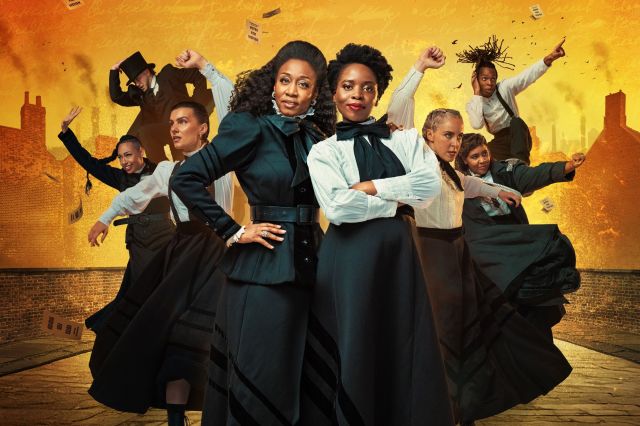A power cut added extra drama to the opening last night (25 March 2008, previews from 7 March) of Yasmina Reza’s new comedy God of Carnage at the West End’s Gielgud Theatre (See Also Today’s 1st Night Photos).
An hour into the press performance, the on-stage lights waned. A few minutes later, the four-strong cast – Ralph Fiennes, Tamsin Greig, Ken Stott and Janet McTeer – carrying on in semi-darkness, were interrupted by a stage manager who explained that the theatre (in fact, all of the theatres on that part of Shaftesbury Avenue) had been hit by a partial power cut that had knocked out the stage lighting and sound desk.
Producers Pugh and Rogers and theatre owner Cameron Mackintosh asked the audience to remain patient. After a 15-minute break and Pugh’s declaration that the show must indeed go on, the performance resumed with the house lights up, minimal “working lights” on stage and sound effects (mainly, regular phone ringing) left to the collective imagination.
God of Carnage revolves around two sets of parents who meet to discuss a playground altercation between their 11-year-old sons. The English-language premiere reunites for the first time the team behind Art, which ran for eight years in the West End – translator [Christopher Hampton, director Matthew Warchus and producers David Pugh and Dafydd Rogers (as well as designer Mark Thompson, lighting designer Hugh Vanstone and composer Gary Yershon). The production is booking until 14 June.
Though in his address to last night’s audience, producer David Pugh threatened to “bloody kill” any critics who mentioned the power cut in their reviews, few were able to resist – however, the event certainly didn’t dim their praise. In addition to “handling the crisis so deftly”, the cast were applauded for their “style and finesse” and “superlative comic performances”. As for the piece itself, while all critics greatly enjoyed themselves and welcomed the Art team’s latest collaboration, some worried that Reza has tried too hard to make us “see her molehill as a mountain”, overburdening the comedy with inappropriately weighty macrocosm metaphors.
Michael Coveney on Whatsonstage.com (four stars) – “An apparently superficial domestic comedy unravels as a grim anthropological study of fractured manners, marital rifts and drink-fuelled truth-telling, not to mention a surprise fit of projectile vomiting all over the coffee table books … Hampton’s English text has the quality of a Gallic Edward Albee. Every line stings like a poignard, and Matthew Warchus’ production, on a stark, blood red setting by Mark Thompson that suggests a tragic dimension the play grows into, is acted with style and finesse by a dream of a vocal quartet: Fiennes is the acidulous tenor, Stott the rumbling baritone, Greig the skittering soprano and McTeer the full-on dangerous alto. This is easily the best of the Hampton/Reza combinations since Art and is at the very least a big shot in the arm for new comedy in the West End. It is also a brilliantly uncomfortable dissection of the way some of us live now, and all your middle-class professional neighbours with problem children – and problems, period – will want to see for themselves.”
Michael Billington in the Guardian (four stars) – “All four actors are excellent and, in Matthew Warchus‘ deft production, show the thin veneer of bourgeois pretence. But, even allowing for the enforced break two-thirds of the way through a 90-minute play, nagging questions arise. You wonder how the marriage of a chic radical like Veronique to a deep-seated racist like Michel has endured as long as it has. And there is a sense of accelerated Albee about the breakdown of the pales and forts of reason under the influence of a few glasses of rum: if anything, the play is too short to be a wholly plausible metaphor for the decline of western civilisation. But, to those who dismiss Reza as a boulevard writer, I would counter that she has the courage to tackle big themes; and this performance is full of delights. McTeer’s voice seems to sink into her boots as she reveals Veronique’s real venom. Fiennes’ comic indifference gradually acquires a tragic edge. Stott also exposes the cowardice behind his macho bombast and Greig, as arguably the sanest of the quartet, conveys the sickly impotence of liberalism. Reza’s commercial success is often held against her; but here, as so often, she holds the mirror up to bourgeois hypocrisy with the savage indignation of a born satirist.”
Charles Spencer in the Daily Telegraph – “One of the great things about live theatre is that there is always the possibility of things going disastrously, gloriously wrong – and last night they did just that … But what a pleasure it was to see the starry cast – Ralph Fiennes, Tamsin Greig, Janet McTeer and Ken Stott – handling the crisis so deftly. And there was something appropriate about the lights going out, for the comedy’s somewhat grandiose theme is the fragility of western civilisation … Reza takes her own work extremely seriously, insisting that she really writes profound tragedies rather than elegant comedies, but fortunately her English translator Christopher Hampton always proves extremely generous with the jokes. The director Matthew Warchus choreographs the escalating violence with superb precision while drawing superlative comic performances from the cast. I never previously suspected Ralph Fiennes of being funny, but his boorish lawyer, constantly taking calls on his mobile and secretly proud of his psychotic son, is sheer joy. Tamsin Greig is equally hilarious as his wife. Janet McTeer proves outstanding as a caring earth mother who turns into a wild-woman warrior, while Ken Stott reveals shocking layers of misanthropic cynicism beneath his character’s twinkly manner. I am not sure The God of Carnage is as profound as Yasmina Reza doubtless thinks it is, but it certainly offers a crackling night of electrifying comic acting – even with the lights at half power.”
Alice Jones in the Independent – “Imagine the most supremely awkward social situation you can and multiply it tenfold … that is the nightmarish scenario cooked up by Yasmina Reza in her new play, God of Carnage … Last night’s star-studded audience was clearly willing her to succeed this time round too. But however much they tried to roar with laughter at every possible opportunity and cheered on the heavyweight cast – Ralph Fiennes, Janet McTeer, Green Wing‘s Tamsin Greig and Art alumnus Ken Stott – it didn’t shine, and not just because a power cut dimmed the lights half-way through … The cast do try to give it their all. Stott has a pleasing moment when he rants and raves like a madman and McTeer as his bleeding-heart liberal wife … is a wonderfully comic mixture of earthiness and brittleness. Greig also explodes into life after a quiet start … But Fiennes never convinces as Alain, her boorish lawyer husband. He is not, unlike the rest of the cast, a natural comic and his killer, bone-dry one-liners hit the mark only half of the time … This is Reza’s nastiest play yet. She has proved she can skewer the middle classes like no other, stripping back the social niceties to reveal the grotesque prejudices and cruelty not only of her characters but also of the audience. In the end, this curious hybrid of Who’s Afraid Of Virginia Woolf? and Ayckbourn-esque farce left me feeling distinctly queasy.”
Benedict Nightingale in the The Times (four stars) “With Matthew Warchus directing these superb performers and Christopher Hampton translating, the effect is tense, edgy and funny. The problem, as the title hints, is that Reza wants us to see her molehill as a mountain. Her subjects come to embrace African genocide, conflict resolution, restorative justice and the moral nature of us human animals – and, though she might retort that microcosms may imply macrocosms or acorns signify oaks, the play cannot bear such weight … A bottle of rum is unwisely opened. Emotions intensify. Alliances shift this way and that. Misogyny, racial prejudice and homophobia enter the equation. Stott sneers at his wife’s ‘Sudanese coons’. McTeer’s virtuous façade cracks when Greig, who has earlier maddened her by vomiting on a favourite book, calls Bruno ‘a snivelling little poof’ who deserved his beating. Despite a touching end, we are not left feeling that Reza has much faith in love, altruism or you and me. If we cannot solve playground rows, how can we halt the world’s atrocities? Sometimes I felt that Reza’s scepticism, rather than human logic, was manipulating her characters and determining their misbehaviour. But again and again, I found myself delighted by her incisive observation, her acerbic wit, her shrewd humour – and her stunning cast.”
– by Kate Jackson












